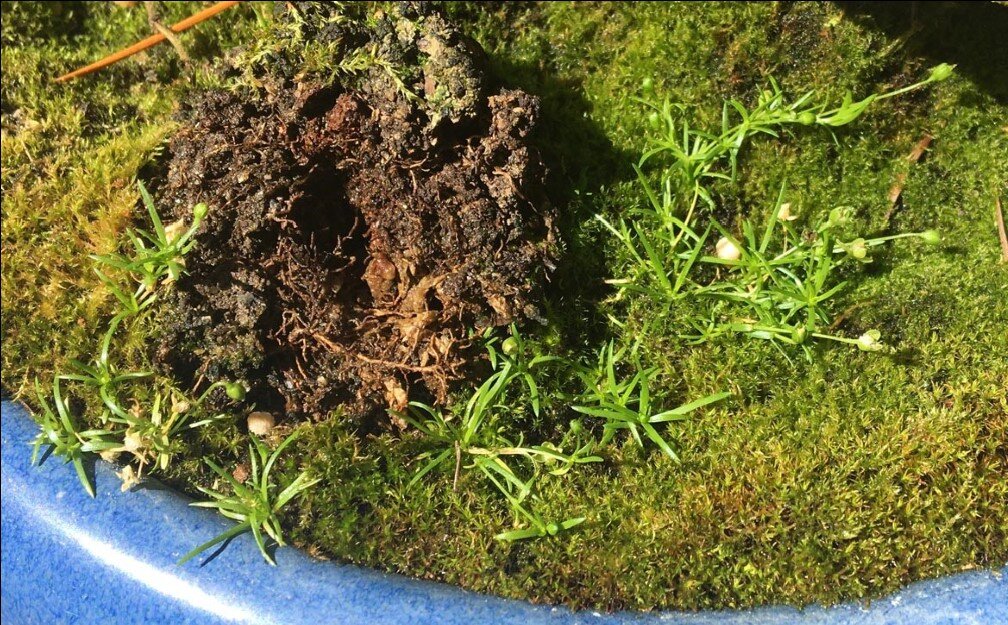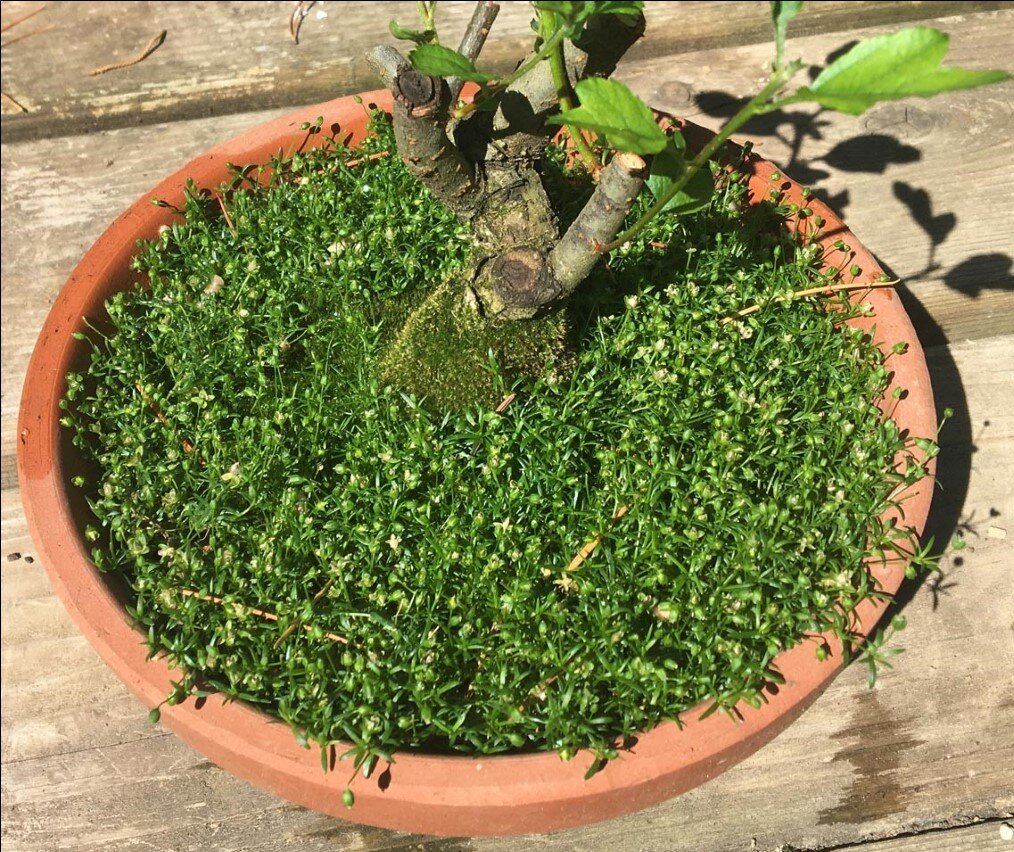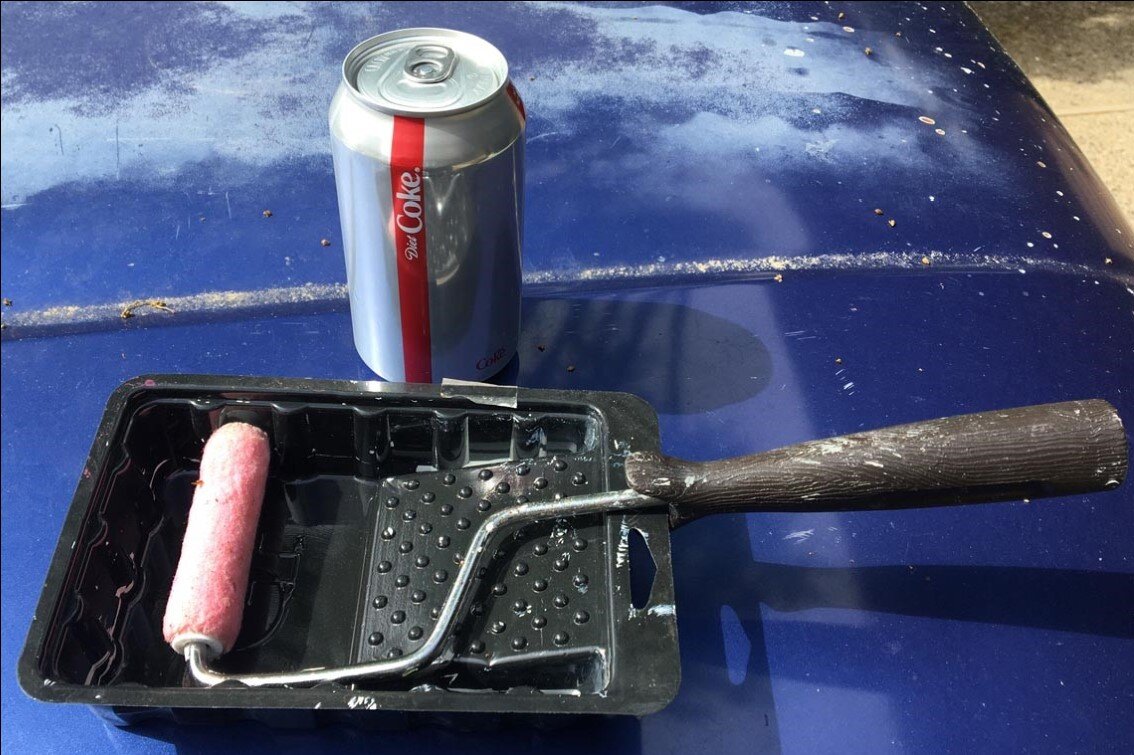I hope that everyone is having a great summer and that your bonsai are doing well. I know that I have really missed the BSOP meetings and am anxious to get back at it and see you all. In the meantime, I have been hard at work, pruning, watering, fertilizing, and spraying. Occasionally I do the bonsai shuffle, either chasing or avoiding the sun, all to keep my trees maximizing their growth and health at this time of year.
Beginnings of a pearlwort invasion. Tiny green stars with satellites forming.
One of the biggest challenges that I have faced over years is keeping my trees weed free. Last year I vowed to kick my arch nemesis, pearlwort, in the you know what. He took it on the chin and it certainly was a knock down, but not completely out. I am back at it this summer with tweezers in hand. The challenge being too many trees and too little time. That, and the fact that open, well-watered bonsai soil provides ideal conditions for weeds to proliferate. When things get out of hand, it’s time to break out the big guns and leave no tiny weed unscathed. Last year I began some experiments that were very successful, so I wanted to share the results with you here.
Total infestation in a pot.
The idea started forming in my head when I recalled that the First Lady of Shohin, Anne Spencer, mentioned that she used a small paintbrush to apply Roundup (Glyphsophate) to individual leaves of weeds to kill them. I am not sure of any other conditions, but her collection was immaculate, so whatever she did, worked. That said, my first line of defense against weeds is always the tweezer. Angled tweezers to be exact. You need one with a broader head so that it does not merely cut the weed off. The first test of my recent carpal tunnel surgery was in fact, a 45-minute session of pulling weeds, pain free. Not something I could do before, but now my excuse is gone (Doh!).
Roller and tray set up. The coke can is just for size comparison.
But then life does randomly, and all-too often, get in the way of best intentions and we are overwhelmed by the weed onslaught. I knew that I did not have time to use a paint brush (in previous years I tried a wide, flat brush, which did work, but lacked control), so I thought I would try a little mini roller, that you might use in painting small projects. I am including a photo here so that you can see my set-up. The roller is only about 3 inches wide.
At this point, I have to put in a disclaimer. This is what I consider a very dangerous and risky procedure. Use it with caution. Many, many years ago I tried Roundup on a wisteria to kill some weeds and ended up slowly killing the tree. I made two critical mistakes at that time. The first is that I used a spray bottle. That meant that I had an excess of chemical that was able to penetrate into the soil, and down to the roots. Secondly, all my wisteria sit in tubs of water during the summer. That excess of water, I believe, acted like a wick and pulled the Roundup into the soil mass. That is something that does not happen in regular application. The combination was deadly. I knew going into it this time that it was going to be risky, but sometimes you need a calculated risk to come out on top. Enter in the roller, which I could use to apply the chemical in smaller, evenly controlled amounts.
Dead pearlwort and green moss.
Roundup works on contact with the leaf surface, so once it hits the soil and dries, it becomes basically inert. I can’t speak any more authoritatively on that aspect. But the leaves absorb the chemical which is then translocated down to the roots, eventually killing the plant. This process can take several weeks, so don’t expect immediate results. I use this method on Pearlwort. Sagina procumbens, also goes by the name of Irish or Scotch Moss (not a true moss), but you can use it on any weed. But not moss. That is what is so great about Roundup in particular for this use is that it only works on higher order plants, but not moss. Your moss stays nice and green.
Roundup has been a source of controversy for a long time, and I must let you know that after many years, there was a recent successful lawsuit about Roundup. I have no details on that, so you can research this if you like. I always wear protective equipment, like nitrile gloves and protective eyeglasses when applying the chemical. For dilution, the easiest thing to do is use what you might already have mixed up in a sprayer for landscape applications. If not, use the proportions stated on the label. Use the minimum amount of chemical needed to cover the weeds. I roll it out onto the weed and go back and forth in different directions to make sure I get it covered. Warning, you will get lots of debris on the roller and in the tray, but it doesn’t really matter.
The aftermath of wholesale pearlwort slaughter
The first thing that I do in the process is to make sure that the trees are well watered. The last thing I want is to come back and water my trees five minutes after applying a chemical of any kind. I water first, so that any chemical applied to the surface of the pot or to the leaves has a chance to thoroughly dry. Don’t apply the chemical on rainy days as it will wash off, making it useless and possibly harming your trees. There are other weeds that this can this can be applied to, like oxalis (clover) and violets. All three of these weeds have deep tap roots and tend to tear off when you pull them. Killing them chemically allows you to come back later and pull out the remains cleanly. This brings up another crucial point. Once the weeds are dead, you still have to remove their brown carcasses, but it very easy to do at this point.
Roundup gel
You might be reading along and at this point, or much earlier, thought that I am really, really crazy. Well, the idea is strong enough that Roundup actually makes a product that works in a similar way. It looks like a large underarm deodorant stick. I found it on the shelf at Wilco and thought I needed to give it a try just for this article. It works similar to some deodorants. You turn the knob on the end until a gel pops out of the many holes, which you then smear on to the leaves of the weed of your choice. I don’t think that it works nearly as well as the small paint roller. Plus, you can’t really tell how well that you are getting it on the weeds. I think the product is doomed anyway.
If you are a person who will get down on your knees to put that particular product on a weed in your lawn, you are probably a person who will just pull the weed out while you are there. I am not expecting it to be the next big fad in gardening. Which brings me full circle to my weed maxim. Tweezers are still your best friend and number one weapon in the fight against weed tyranny.
Scott Elser






